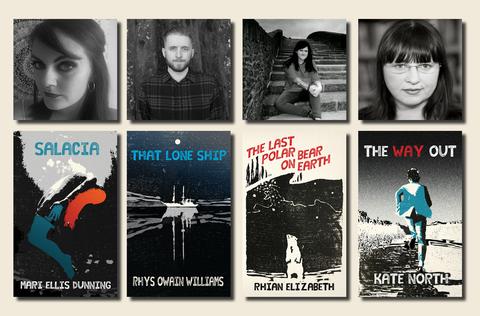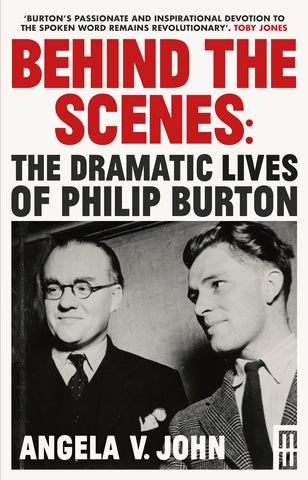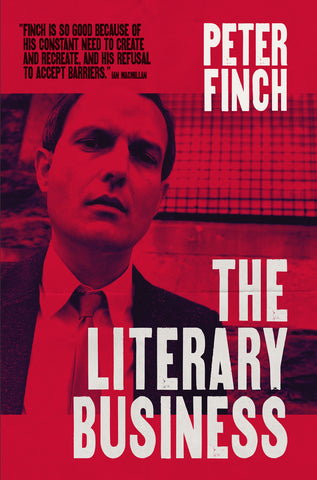Our four poetry titles, released as a series in October 2018, have all been favourably reviewed by Gareth Leaman in the latest issue of Poetry Wales.
'The most emotively immediate of the four, Mari Ellis Dunning's Salacia brings to life a world in which Welsh women do not write their own stories, but rather have stories written upon them. We encounter rarely heard voices from the history and mythos of Wales and beyond, with an intense focus on the struggle of ensuring these voices ever reach an audience, achieved through an acute sense of the literal physical pressures of misogynistic microagressions. [...]Dunning provides an important voice in a Welsh political climate in which anything that detracts from heteronormative, masculine nationalism is marginalised as a 'niche issue'.
Salacia has been shortlisted for Wales Book of the Year, and the winner will be announced in Aberystwyth on 20 June 2019.
We've got everything crossed for her!
'Rhys Owain Williams' That Lone Ship explores the same social struggles from a different perspective: that of a working-class crisis of masculinity in left-behind communities. "The Pint That Follows" takes this up early in the collection: we encounter a struggle to speak, an overreliance on language, and the undue responsibility placed on communication to forge and maintain relationships. Silences are comfortable but inadequate: scant words reach out but never land, and yet somehow the attempts to communicate are enough, for now. Williams' work is defined by the gestures made when we know language won't suffice – in fact, it's the gesture that generates meaning. [...] all the works in this collection take on this melancholic transience. The lines move like their ever-present rivers: all meanderings and detours, shaping and shaped by their landscape in relentless search of finality. They sweep all ideas dropped into them toward the calm void of the sea: words flowing like flotsam out into Swansea Bay.'
'Rhian Elizabeth's The Last Polar Bear on Earth exemplifies a similar sense of everyday mundanity to relay the austere beauty of being: the quiet, desperate simplicity of life under duress. Elizabeth finds the value of life in its restrictions, not as an act of acquiescence but as an act of defiance. She understands that to aestheticise your surroundings, to play with one's perception of them, is to assert control. The life presented here is lived through lenses: [...] She relates to the world through late night news, pornography, Hollywood movies, and this in turn is how we relate to her. [...] While the other collections discussed here have more of a palpable "Welshness", with Elizabeth this is often felt only through its absence. [...] Solidarity here is presented in its societal and political lacking. The speaker's life is instead at the mercy of the bureacracy and the callousness of the state, the banal evil of the DWP in granting and moderating life. But again, as with the other works, a potential for solidarity fights through: the aestheticisation fades as the collection progresses, real life comes into focus, and the "coping mechanism" function of the hyperreal imaginative play found in earlier poems becomes clear...'
'Kate North's The Way Out offers a similar insight into the mutual dependencies of bodily repression and community belonging, in what is undoubtedly the most assured voice of the works discussed here. [...] the enduring theme of the collection is of existential crises induced by medical trauma. We encounter images of bodies being thrown into being and snatching at autonomy [...] there is an inverse aestheticisation at play here: the imagery is masking a reality rather than bringing it closer to us, and the trauma is brought into focus at the same time as we are distanced from it. [..] Like Neruda's "I'm explaining a few things", North sets out her craft and the descriptive capacity of poetry, but then invites us to contemplate the dilemma of all morally and aesthetically perceptive poets: how to write of the beautiful when all that's observed is mostly horror. In North we have a similar particular/universal interplay we've seen in the other works discussed here, but taken one step further into a discussion of the nature and purpose of poetry itself.'
All four titles are available from our online bookshop for £8 each
We also recently released Kate Noakes' seventh poetry collection The Filthy Quiet:
'The Filthy Quiet is a whirling journey across a lifetime, over great emotional highs and lows. Chronicling the collapse of one long-term relationship and the trials and tribulations of forging a new life. Noakes’ collection is intense and deeply personal. Also included here is an intriguing sequence of confessional poetry, inhabiting the voices of women in mythology.' – PBS Spring Bulletin 2019
We've more exciting poetry titles coming your way this October: new & selected poems from J.Brookes, debut collections from Roberto Pastore and Kittie Belltree, and then, in early 2020, a second collection from Christina Thatcher. Our poetry in translation list will also gain two new additions, with the Home on the Move anthology edited by Manuela Perteghella and Ricarda Vidal and released this July, and Pomegranate Garden, the selected poems of one of the most prominent poets writing in Turkey today, Haydar Ergülen, out in October.
Enjoy!
Susie x



